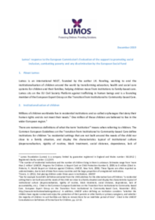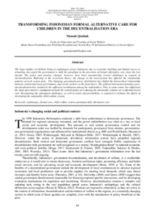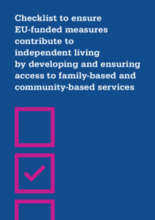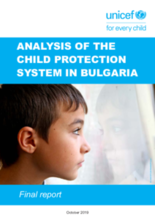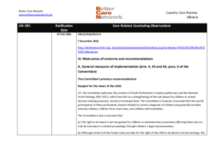Displaying 161 - 170 of 691
This chapter traces and explains responses to deinstitutionalisation reforms in the Russian regions. Three parallel policy shifts are taken into account: deinstitutionalisation (DI), public sector reform, and social provision reform.
In this chapter of Reforming Child Welfare in the Post-Soviet Space, the authors analyse how children in foster care in Russia perceive their experiences in foster families through the use of biographies.
The Finding the Way Home documentary highlights the painful realities of the eight million children living in orphanages and other institutions around the world, telling the stories of six children in Brazil, Bulgaria, Haiti, Nepal, India and Moldova who have found their way into the care of loving families after spending periods of their lives in an institution.
This brief from Lumos reviews the the transition from institutional to family and community-based care under the European Social Fund (ESF) funding period 2014-2018, including promising deinstitutionalisation practices, and outlines key recommendations to the European Union for the completion and implementation of the ESF+ 2021- 2027 funding period.
This video from World Without Orphans tells the story of Anu, who was abandoned as an infant and grew up in a large institution in India, later opening her own home for orphaned and abandoned girls. Anu came to realize that this was not the best way to care for the children and began, instead, to work within the community to provide education, food, medical care, and a way for children to remain in families.
This article describes the challenges in changing policy and practice in the provision of formal alternative care in Indonesia.
The purpose of this checklist from the European Expert Group on the transition from institutional to community-based care, with Hope and Homes for Children, is to ensure EU funds in the 2021-2027 programming period contribute to independent living and inclusion in the community, including by supporting desk officers to check the consistency of the measures to transition from institutional to family-based and community-based services for children and the prevention of institutionalisation and separation of children, including with disabilities, from their families.
This research is based on a stock-taking of the current situation. It is based on a comprehensive literature review and a genuine primary research with service users as well as policy makers, service providers, children and families.
This country care review includes the Concluding Observations of the Committee on the Rights of the Child and the Committee on the Rights of Persons with Disabilities. The Committees' recommendations on the issue of Family Environment and Alternative Care, and other care relevant issues, are highlighted.
The aim of this module from the book Rights-based Integrated Child Protection Service Delivery Systems is to learn to place children in specific alternative childcare services.

